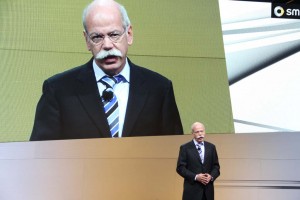
Daimler CEO Dieter Zetsche and other senior execs will soon have the Dept. of Justice off their backs.
The U.S. Department of Justice is moving to wind up the bribery case it filed against Daimler AG more than three years ago. The DOJ has filed a motion to dismiss the case in Federal Court after being satisfied that the German industrial giant has reformed its internal code of conduct and business practices.
The corporate cleanup, which included the dismissal of senior executives, the demotion of others and appointment of an official with the authority to enforce the new anti-corruption dictates, followed a landmark settlement with the Justice Department.
As part of the settlement, Daimler AG entered into a “”deferred prosecution agreement” and agreed to the accept a single charge that the company conspired to violate the books and records provisions of the U.S. Foreign Corrupt Practices Act, along with one count of actually violating those provisions.
Daimler AG’s Chinese subsidiary DaimlerChrysler China Ltd. (DCCL), now known as Daimler North East Asia Ltd., also entered into a deferred prosecution agreement and agreed to the filing of one count of conspiracy to violate the anti-bribery provisions of the FCPA and one count of violating those provisions. Daimler AG and its subsidiaries paid $185 million in criminal fines and penalties as part of the settlement
It also agreed to the appointment of an independent monitor. Former FBI Director Louis Freeh was selected for the task. He urged the company to appoint a senior executive to oversee changes in the company’s practices.
Christine Hohmann-Dennhardt has been the Member of the Board of Management of Daimler AG for Integrity and Legal Affairs since February 16, 2011. Her area of responsibility covers the Group’s legal departments, compliance organization and data protection. Responsibility for respecting and maintaining human rights and for the sustained anchoring of a culture of integrity is also in her area.
A former member of the Constitutional Court, Germany’s highest court, who also had served as a minister of justice in the state of Hessen, Hohmann-Dennhardt, acknowledged the anti-corruption effort has forced changes on Daimler’s internal corporate culture. “We created our own standards,” she said.
The changes have been substantial, she added during a lunch with a small group of reporters in New York City. Daimler had rules against bribery and other practices but the rules were rarely enforced and there was something of a gentleman’s agreement among senior executives to ignore them.
That was shown to no longer be the case when, nearly two years ago, former Mercedes-Benz US CEO Ernst Lieb was fired for ethical breaches.
Another major problem was structural, she noted. The compliance officer responsible for enforcing the rules reported directly to the senior sales executives tasked setting sales targets and quotas. The compliance officers now report directly to Hohmann-Dennhardt rather than the sales organization.
The attitude wasn’t unique with Daimler, Hohmann-Dennhardt noted. Up until 1995, German companies could actually deduct bribes from the corporate tax returns the filed with the German government . In all, the DOJ charged Daimler with bribing officials in 22 different countries around the world.
Hohmann-Dennhardt, however, said Daimler’s anti-corruption effort is now at leading edge of changing German attitudes on using bribes as a way of getting favorable treatment on certain contracts. “it’s a societal change,” she said.
While enforcing the changes, Hohmann-Dennhardt said she has tried to be sensitive to the competitive pressures Daimler employees face around the world. In some developing markets, the anti-corruption effort could cost the company business.
But going along with corrupt practices is ultimately bad business, she said. It hurts the company’s reputation. Customers can also have complete confidence in a vehicle built by Daimler, she said. “In the long run, it will bring us new business, because (the vehicle) has been produced on the basis of integrity,” she said.
During his review of Daimler’s practices, former FBI Director Freeh also found violations in West Africa, for example. There, the extra cost of bribes was added to normal operating expenses and Daimler was actually losing money.
Hohmann-Dennhardt also stressed the effort to build a culture of integrity at Daimler wasn’t limited to a small group of senior managers. While the top 150 managers have been given some extensive information about the new rules, Daimler also has created an “integrity truck” that travels to the company’s plants and demonstrates for employees at all levels of the company what’s considered improper behavior.
The trucks have made stops at Daimler plants all over the world, including China, and employees are also asked to provide suggestion on how the company can do a better job in living up to its own code conduct.

This is called a “buy off”. Microsoft is most famous for using these when convicted by the DOJ on massive consumer fraud. Microsoft never changed their business practices one bit. The EU is the only contry with the integrity to fine Microsoft hundreds of millions of dollars for their chronic consumer fraud.